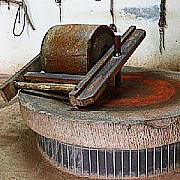bailewen wrote:Now your just being intentionally obtuse. Either that or you simply refuse to look into non-Christian sources.
I provided several Orthodox Jewish translations. I'm talking about people who, in many cases, have Hebrew as their native language. I provided not only a translation but the etymology of the word.
חמד
Look it up. Three letter root, just like all Hebrew verbs: Heh, Mem, Dalet. Same verb used in Proverbs 12:12 where the King James translates the exact same verb as "desireth"12The wicked desireth the net of evil men: but the root of the righteous yieldeth fruit.
Here is the original Hebrew:
חָמַד רָשָׁע, מְצוֹד רָעִים; וְשֹׁרֶשׁ צַדִּיקִים יִתֵּן
Here is Exodus 20:13 in the original Hebrew:
יג לֹא תַחְמֹד, בֵּית רֵעֶךָ; {ס} לֹא-תַחְמֹד אֵשֶׁת רֵעֶךָ, וְעַבְדּוֹ וַאֲמָתוֹ וְשׁוֹרוֹ וַחֲמֹרוֹ, וְכֹל, אֲשֶׁר לְרֵעֶךָ. {פ}
The relevant verb is the 3 word in the verse.Every Bible I've come across translates it "adultery"
Here is the American Standard Version translating the term as "covet":
http://bibletools.org/index.cfm/fuseact ... ersion/ASV
Here is the King James version of 20:17 where, yet again, the verb is translated as "covet"
http://www.biblegateway.com/passage/?se ... ersion=KJV
Jewish Publication Society
http://www.mechon-mamre.org/p/pt/pt0220.htm
New International Version
http://www.biblegateway.com/passage/?se ... ersion=NIV
New American Standard
http://www.biblegateway.com/passage/?se ... rsion=NASB
So you've never come across the American Standard, The King James, The Jewish Publication Society, The New International Version, The New American Standard Version... .
Just what bible are you relying on. I am actually finding it kind of difficult to trace down a version that actually translates the term as "adultery". You must have a pretty narrow cannon.
Nice.
.



